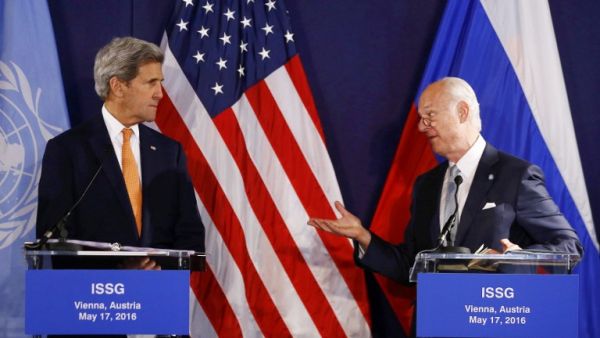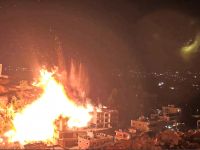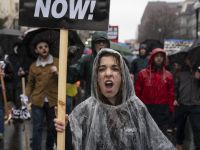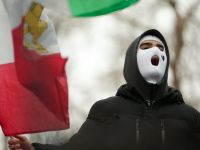The conflict parties in Syria's civil war will face consequences if they break the truce or block aid shipments, global and regional powers warned Tuesday in Vienna, at a meeting aimed at getting peace talks back on track.
Foreign ministers of the 17-country International Syria Support Group met in the Austrian capital to shore up support for the shaky deal on a ceasefire and humanitarian shipments that they brokered in February to enable peace talks between the Syrian regime and opposition.
Led by US Secretary of State John Kerry and Russian Foreign Minister Sergei Lavrov, the group announced in a statement that they may exclude a conflict party from the truce if it "has engaged in a pattern of persistent non-compliance."
In addition, the contact group warned that it may inform the UN Security Council if a conflict party systematically blocks aid deliveries.
In addition, Russia, a key military ally of the Syrian government, distanced itself from embattled Syrian President Bashar al-Assad on Tuesday.
"We don't support al-Assad. We support the fight against terrorism," Lavrov said at a joint press conference with Kerry.
Lavrov clarified that, while Russia does not protect al-Assad personally, it views the Syrian military as a key force in the fight against terrorism.
"Russia has worked closely with the United States to upgrade our ability" to maintain the ceasefire, said Kerry, whose government backs armed rebels who are fighting al-Assad's troops.
Russia has leverage on al-Assad and reports that the president has agreed to constitutional reform, Kerry said after the meeting.
"There is no way to end this without a political solution," Kerry said.
The meeting of UN veto powers and Middle Eastern countries in Vienna came after the Syrian opposition walked out of peace talks in Geneva last month, to protest an increase in fighting and the government's blocking of humanitarian and medical aid.
In a nod to the opposition, the chief diplomats in Vienna asked the United Nations to set up air bridges and air drops of aid to several besieged areas in Syria from June if the UN is still being denied access by then.
"Credible intra-Syrian talks will become credible when ... there is a credible development on the cessation of hostilities and a credible improvement on the humanitarian side," UN Syria envoy Staffan de Mistura said.
German Foreign Minister Frank-Walter Steinmeier told reporters that he hoped for peace to extend across the Syrian region of Aleppo, one of the major flashpoints of violence.
At the same time, he acknowledged that Tuesday's diplomatic debate had been "controversial."
The Vienna talks also include top diplomats from regional foes Saudi Arabia and Iran, which back the rebels and the regime, respectively.
While the Syrian opposition demands that al-Assad step down and pave the way for a political transition, the Syrian government delegation in Geneva has so far refused to talk about such a scenario.
Iranian Foreign Minister Mohammad Javad Zarif said his country supported the truce and a peace dialogue, but he warned that a complete ceasefire might aid terrorist groups operating in Syria.
"We should not allow terrorists to use the cessation of hostilities for further terror operations," he said.
The truce deal does not extend to the extremist groups Islamic State and al-Nusra Front, al-Qaeda's Syria branch, meaning attacks against those groups may proceed.

US Secretary of State John Kerry and UN Special envoy for Syria Staffan de Mistura address a joint press conference in Vienna, Austria, on May 17, 2016. (AFP/Leonhard Foeger)







